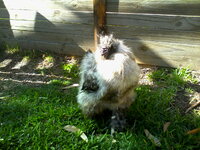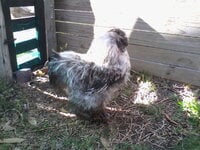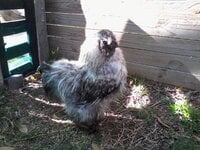Lobodugald
Songster
- Dec 22, 2019
- 63
- 50
- 108
Hi everyone.
I recently adopted an unwanted Silkie rooster. His ring shows him to be around three years of age. He has wry neck. He eats and drinks okay but he falls over if he tries to run or mate with the hens. His crooked neck seems to put him off balance and makes him fall over.
He doesn't seem to be in any pain and seems to love life (although I think he may be a little "frustrated" because he can never successfully mate with any hen as he always falls off so he spends all day chasing hens.)
Anyway, is there a cure for this? Does he need to see a "chicken chiropractor" or will massage and manipulation not work for this condition?
It is my understanding that chicks hatched with this condition are either cured at a young age or culled but someone left this bird to grow into adulthood and I cannot find anything on Google that says how to help an adult bird with wry neck.
Thanks in advance....
I recently adopted an unwanted Silkie rooster. His ring shows him to be around three years of age. He has wry neck. He eats and drinks okay but he falls over if he tries to run or mate with the hens. His crooked neck seems to put him off balance and makes him fall over.
He doesn't seem to be in any pain and seems to love life (although I think he may be a little "frustrated" because he can never successfully mate with any hen as he always falls off so he spends all day chasing hens.)
Anyway, is there a cure for this? Does he need to see a "chicken chiropractor" or will massage and manipulation not work for this condition?
It is my understanding that chicks hatched with this condition are either cured at a young age or culled but someone left this bird to grow into adulthood and I cannot find anything on Google that says how to help an adult bird with wry neck.
Thanks in advance....





 )
)
